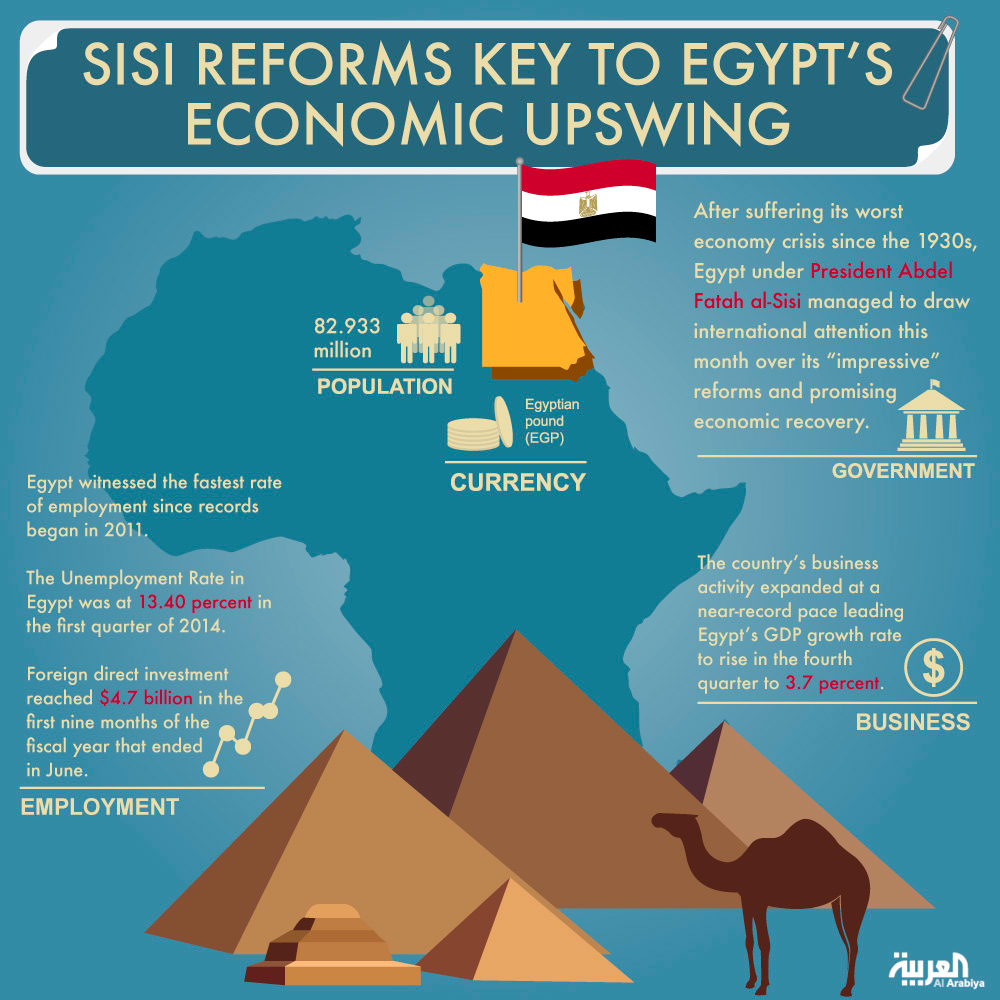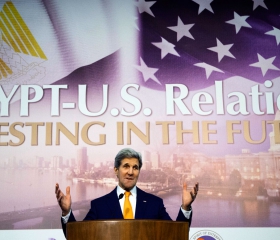Russia is working hard to bolster its diplomatic, economic and military clout in the Arab world along several tracks, among them through Egypt, a regional leader that has been declared by President Vladimir Putin as "a very promising country". For its part, Cairo is doing its best to expand cooperation with Moscow along political, military-technical, energy, trade, investment and other dimensions. At the same time, the Egyptian market remains highly risky, requiring a balanced analysis of opportunities for Russian-Egyptian cooperation that is offered in this article.
The all-out destabilization caused by the Arab Spring has severely damaged the Egyptian economy, bringing about Muslim Brotherhood rule after the overthrow of President Hosni Mubarak. Although the military coup in the summer 2013 removed the Islamist government led by Mohammed Morsi, incumbent President Abdel Fattah el-Sisi believes the country still faces a threat of disintegration, mostly because of popular support for Islam and Islamists, as well as economic troubles. Emaciated Egypt has been virtually permeated by the rising extremism fueled from the outside by the civil war in Libya and the continuing bloodshed in Syria and Iraq, pushing the new government to focus on domestic stability.
Egypt is now being ruled manually by a president with unlimited powers and loyal officers occupying key government posts. The country has operated without a legislature for three years, and the next parliamentary elections are planned for October or November 2015.
Cairo is trying to create an investor-friendly environment and patch up the economy through ambitious projects like the recently commissioned second lane of the Suez Canal worth USD 8.2 billion, the USD 45-billion construction of a new capital for all national ministries and foreign diplomatic missions, and the construction of nuclear power plants and other facilities.
Why Cairo is Turning to Moscow
Due to these above-mentioned circumstances, Egypt badly needs foreign aid, but has been bitterly castigated by the United States, the EU and Turkey for repeatedly and brutally suppressing political opponents, primarily Islamists who are in opposition, as well as for arresting journalists. Regarding Mr. Morsi as the legitimate president, Washington has condemned the coup and has not rushed to assist the new Egyptian government. Ankara is even more straightforward, calling upon the West to sanction Cairo.
Unable to build a relationship with Washington on its own terms, Cairo has had to approach Moscow which has come across as sympathetic to Mr. Sisi's domestic policies and is ready to assist him in fighting terrorism, first of all ISIS.
Despite external pressure, the principled and unwavering support of Syrian President Bashar Assad has boosted Russia's prestige in the region, generating respect even from the Gulf monarchies which harshly oppose Mr. Assad. Against this backdrop, Cairo is very interested in regional-level political interactions, as well as the development of trade, economic and investment ties with Moscow.
Egypt also counts on Russia's support in its quest for better relations with the BRICS and for a free trade area with the Eurasian Economic Union.
In addition, Cairo regards Moscow as an additional source of weaponry, energy and technology. Notably, the situation is to a certain extent defined by inertial political thinking. On the one hand, Egyptians would like to grab the attention of the United States, while on the other, they are still blinded by Cold War stereotypes, expecting assistance from Russia preferably for free.
Why Egypt is Attractive for Russia
Since Egypt is still influential in the Arab world and in Africa, it may offer Russia dividends both in bilateral and regional terms.
Egypt is Russia's key trade and economic partner in North Africa, with turnover invariably rising despite all of the problems in Egypt. By the end of 2014, bilateral trade reached USD 5.5 billion, doubling that recorded in 2013. Russian exports are dominated by oil products (about 30 percent) and grain (about 20 percent). Egypt, the largest importer of Russian wheat, accounts for almost 30 percent of Russia's overall wheat exports. Almost 90 percent of Egypt's exports to Russia are fruits and vegetables, while Egyptians are ready to increase their food supplies, which seems quite appropriate in view of the Russian food embargo.
Moscow welcomes a free trade area between the EEU and Egypt as a move capable of boosting its national economy.
The expansion of the Suez Canal has made Egypt more attractive as a logistical hub for Russian grain companies and industrial enterprises that can expand their access to the markets of third party countries.
At the same time, Russia prefers developing bilateral ties in the belief that Egypt’s admission to the BRICS is premature.
Intensive Top Level Contacts
Cairo has been keen on maintaining ties with Moscow despite the breakdown of the Soviet Union, as even during his brief presidential tenure, Mr. Morsi met with President Putin in the spring of 2013, declaring his willingness to "establish an effective political alliance with Russia."
Today, the bilateral relationship is definitely on the rise. Presidents Putin and Sisi became quite friendly during their first meeting in February 2014, when the latter came to Moscow as a deputy prime minister and defense industry minister, while informing Russia's president of his intention to run for the presidency. Mr. Putin wished him the best of luck and was the first to congratulate him on winning the race.
After that, they met in Sochi on August 12, 2014, in Cairo on February 9-10, 2015, in Moscow on May 9, 2015, and again in Moscow on August 26, 2015. Moreover, on August 6, 2015, President Sisi received Prime Minister Dmitry Medvedev who attended the opening ceremony of the new Suez Canal.
As one can see from the frequency of these high level talks, both Cairo and Moscow are seriously interested in furthering the relationship, since summits help to beat back the red tape that usually holds back the implementation of previous agreements.
Prospects
Among other things, in March 2014, bilateral talks revived the Russian-Egyptian Commission on Trade and Economic Cooperation that was suspended in 2011 because of the Arab Spring. This upcoming December, the next session will adopt a roadmap for implementing joint projects.
According to Prime Minister Dmitry Medvedev, the program should cover heavy and light industry, traditional and renewable energy, transportation machine manufacturing, agricultural sector, telecommunications, pharmaceutics, medicine and education.
Hydrocarbons will be an obvious priority, with LUKOIL already quite active in Egypt. Rosneft and Egyptian General Petroleum Corporation have agreed on the basic terms for the delivery of Russian oil products and liquefied petroleum gas. Rosneft, Gazprom and Gazprom Neft have shown interest in the production of Egyptian hydrocarbons, while the two former companies would like to provide Egypt with LNG.
Another quite promising area is military-technical cooperation, although in the current political and economic environment, Russia is not able to refurbish the Egyptian army which has used American hardware for decades. At that, U.S. Secretary of State John Kerry promised that "Washington will continue its first-rate training and equipment of the Egyptian army." Against this backdrop, Russia can sell only separate batches of its gear. The media has reported that Russia supplied the Antei-2500 system last March and is selling 50 Ka-52 helicopters for the Mistral helicopter carrier, which obviously means steps are being taken.
Egyptians are also eager to cooperate with the Russian aerospace industry.
The two sides are considering establishing a Russian industrial zone adjacent to the Suez Canal, while Cairo has already prepared a package of proposals for Russian investors that includes 120 projects worth USD 135 billion. The sides have set up a special working group authorized to formulate specific proposals for the development of the zone.
Russian businesses see dividends from cooperating in the construction and upgrading of industrial, energy, transportation, logistical and residential facilities in Egypt, as well as the employment of the GLONASS navigation system.
One should also mention specifically the ostensibly largest bilateral project for the construction of a nuclear power plant based on Russian technology that is worth USD 20 billion being built in northwest Egypt. However, optimistic appraisals of the projects are being restrained by problems concerning payment, since Egypt is requesting a government loan. The Russian Finance Ministry has agreed in principle, but the interest rate is still under discussion.
Thus, we are seeing that the interests of the two sides are lining up in many fields, marking the presence of a natural foundation for lasting cooperation bolstered by regular top level contacts. Military-technical ties, energy cooperation and participation in the construction of large facilities should bring contracts to Russian enterprises, while the training of Egyptian personnel to operate the energy infrastructure and military equipment should provide Russia with an additional avenue for expanding its presence in Egypt.
At the same time, ongoing risks necessitate viewing the bilateral relationship through the prism of wider Middle East developments. The entire region will suffer from a lack of progress made on the Syrian track, the core for an effective war against the ISIS, whose equally terrorist-minded affiliates have strongholds on the Sinai Peninsula close to the Suez Canal, graphically threatening Egypt and beyond.
Political and economic instability in Egypt, as well as the removal of President Sisi would run counter to Russia's interests. Hence, Moscow is eagerly assisting Cairo in its counterterrorist efforts through arms sales. The Kremlin is also considering lifting customs duties for Egyptian goods in order to expedite their access to the Russian market and thus support their producers.
At the same time, economic hardships and political instability in Egypt and Russian economic problems render multibillion loans to Cairo quite risky, since Russian budget revenues seem uncertain and Egyptian delinquency could be likely. Hence, cooperation with other actors on the Egyptian market, for example with Chinese companies, appears advisable.
Since Cairo enjoys financial support from Saudi Arabia and the UAE and Russia is developing ties with the Gulf monarchies, the time seems ripe for multilateral consultations on assisting Egypt in restoring its economy through projects based on Arab financing and Russian implementation, which should at the same time build trust between Russia and Arab monarchies.
The risks notwithstanding, it seems appropriate for Russia to build on its obvious achievements in resuming cooperation with Egypt and to try to diversify the scope for at least the partial reinstatement of its stance in the Arab world.







